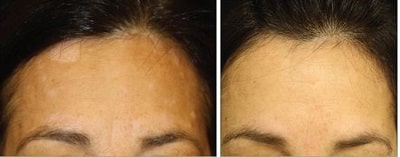I was not planning to write a post so soon after my prior one, but a new development from today is very interesting and exciting.
Regular blog readers will agree that last year’s most exciting developments in the hair loss world were alopecia areata being cured in a few patients. This feat was achieved by arthritis drug tofacitinib, and then again by bone marrow cancer drug ruxolitinib.
Dr. Brett King from Yale University led the work with tofacitinib, and he was interviewed on the Bald Truth show shortly thereafter. Most people on hair loss forums have not been too optimistic about a cure for alopecia areata also working on patients suffering from androgenetic alopecia (aka male pattern baldness). However, in that interview, Dr. King seemed to imply that it was definitely a possibility.
Since that time, myself and numerous others have eagerly hoped that Dr. King would start testing tofacitinib on patients suffering from male pattern baldness. This is by far the most common form of hair loss in both men and women.
Tofacitinib Cures Vitiligo
Instead, today Dr. King shocked the dermatological world for a second time for a totally different reason. Apparently, tofacitinib citrate cured one of Dr. King’s 53 year old female patient’s vitiligo. This latter condition is a devastating skin disease (Michael Jackson supposedly suffered from it).

Tofacitinib is a JAK 1/3 inhibitor that was approved by the US FDA in 2012 for the treatment of rheumatoid arthritis. Below are the before and after images from Dr. King’s latest groundbreaking findings. The source of these images is the full study that can be found in JAMA Dermatology.
Quite a few media outlets have covered this study today, including the UK’s Telegraph and US based CBS News. Here’s to hoping that in 2016 (or sooner), Dr. King publishes yet one more study that finally shows tofacitinib also curing androgenetic alopecia. At least in some patients in which there is also an inflammatory component to the disease.
So far, all of Dr. King’s results from last year and this year suggest that tofacitinib does not lead to any kind of severe side effects when taken under doctor supervision. It should also be noted that Pfizer has filed for FDA approval to treat psoriasis with tofacitinib after successful phase 3 trials. This is all very encouraging when it comes to the safety profile of this seemingly miraculous drug.
Finally, it seems like tofacitinib might also successfully convert white fat (bad) into brown fat (good). An important study on this was published in 2014.